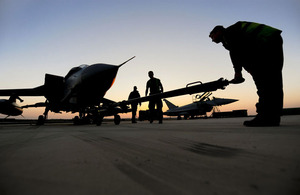NATO delivers update on Libya operations
Speaking in Naples, the deputy commander of NATO's operations in Libya has delivered an update on the situation.

An RAF Tornado GR4 aircraft is prepared for a mission over Libya at Gioia del Colle air base, near Bari in southern Italy [Picture: Senior Aircraftman Neil Chapman, Crown Copyright/MOD 2011]
NATO took over the operation to enforce the arms embargo, no-fly zone and actions to protect civilians and civilian centres as mandated in UN Security Council Resolution (UNSCR) 1973, under the name UNIFIED PROTECTOR, on 31 March 2011.
Rear Admiral Russell Harding, Deputy Commander of Combined Joint Task Force Operation UNIFIED PROTECTOR, said that over the past few days Libyan government forces have increasingly shifted to non-conventional tactics, ‘blending in with road traffic and using civilian life as a shield for their advance’:
As a consequence, they have moved in the direction of Ajdabiya, posing a direct threat to that city, and beyond that, to Benghazi.
He said that, in response, NATO has pursued direct strikes on advancing forces and their logistical and munitions supply chains.
NATO has also used surgical air strikes to sever the main supply route between Ajdabiya and Misurata, Rear Admiral Harding confirmed.
The Deputy Commander stressed that, in doing so, NATO forces have been particularly careful to avoid injury to civilians who are in close proximity to the fighting, often precisely because of the tactics of government forces:
Rear Admiral Harding said that these strikes achieved their main effect, reducing the capacity of government forces to threaten the lives or besiege the cities of the Libyan people:
Indeed, we believe we have reduced by up to 30 per cent the Libyan military capacity which has been mobilised for aggressive action.
We have also rendered their air force inoperative and we have seriously degraded their air defences. These last are critical factors in ensuring civilian protection.
Rear Admiral Harding said that, as of 6 April 2011, Operation UNIFIED PROTECTOR has more than 100 fighter and support aircraft in action, as well as a dozen naval vessels from several nations operating under NATO command:
We have achieved a seamless transition from Coalition ODYSSEY DAWN and are resolved to demonstrate the same commitment and effectiveness.
NATO is operating under a very clear international legal mandate and with broad regional support.
It will take action against any party that threatens aggression or violence, or acts in contravention of UNSCR 1973.
We have the resources and the will to achieve that mandate from the international community and I would like to express thanks to all of the contributing nations - and in particular to the United States as it transitions to a supporting role - for the assets and people they have committed to this mission.
Addressing accusations in some sections of the media that NATO had ‘picked sides’ with the rebels, Rear Admiral Harding said:
Let me be clear - we will attack any forces that mean to harm innocent civilians.
I would remind you that it is Colonel Gaddafi who has stated he will show no mercy to his own population, and it is his military that has shelled civilians, bombed cities and continues to threaten innocents.
Again, we will attack any forces that mean harm to the civilian population.
On the fire reported at a Libyan oil facility, Lieutenant General Charles Bouchard, Commander of Operation UNIFIED PROTECTOR, said:
NATO has been monitoring this area since the beginning of the month where attacks last week by pro-Gaddafi forces have resulted in a number of skirmishes with anti-Gaddafi forces and at least one fire at an oil facility in the region of Sarir.
We are aware that Gaddafi forces have attacked this area in recent days, which resulted in at least one fire at an oil facility north of Sarir. To try and blame it on NATO shows how desperate this regime is.
“We have never conducted strike operations in this area because [Gaddafi’s] forces were not threatening civilian population centres from there. The only one responsible for this fire is Gaddafi and we know he wants to disrupt oil getting to Tobruk.”